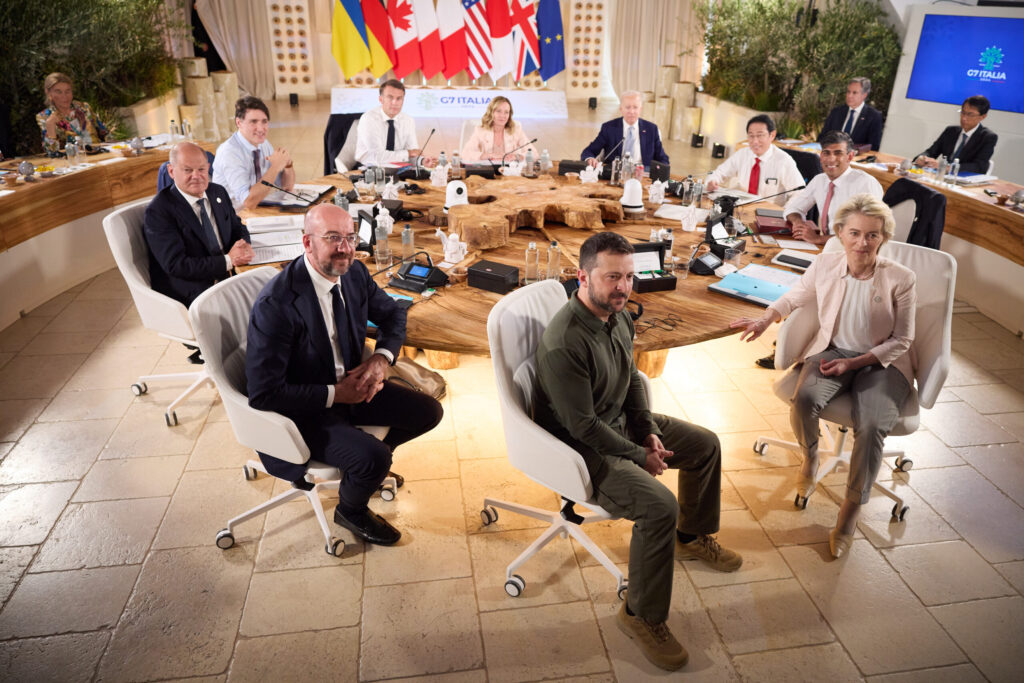The recent G7 summit saw leaders agree on a plan to send $50 billion to Ukraine by forward-collateralizing interest income on Russian assets immobilized in Western countries since February 2022. This initiative, championed by the Biden administration, signifies a significant win for Ukrainian President Volodymyr Zelenskyy. Concurrently, a bilateral security deal with the United States was announced, further bolstering Ukraine’s position on the world stage. The collaborative efforts behind these agreements and their potential impact on the ongoing conflict are analyzed by experts below.
John Herbst, the senior director of the Atlantic Council’s Eurasia Center, points out the strategic importance of the G7’s decision to provide financial support to Ukraine. He highlights the impact of strong US leadership in securing this loan and its implications for Russia and its economic relationships with the West. The move is not only a tactical victory against Russian aggression but also a setback for Chinese pressure tactics on G7 members.
Charles Lichfield, the deputy director of the Atlantic Council’s GeoEconomics Center, commends the G7’s compromise on using the interest income from frozen Russian assets to financially support Ukraine. This diplomatic achievement, exceeding $50 billion, showcases the art of compromise while navigating the sensitivities of different member states. The solidarity displayed by the G7 in this decision is a testament to effective multilateral cooperation.
Daniel Fried, a distinguished fellow at the Atlantic Council, highlights the recent firming up of Western support for Ukraine, emphasizing the significance of the US sanctions against Russia and the G7’s agreement on utilizing Russian assets for Ukrainian assistance. He also mentions the bilateral security cooperation agreement between the US and Ukraine as a crucial step in strengthening Ukraine’s defense capabilities. Despite ongoing challenges, the week has been marked by resolute Western backing for Ukraine.
Rachel Rizzo, a nonresident senior fellow at the Atlantic Council’s Europe Center, discusses the emerging leadership of Italian Prime Minister Giorgia Meloni in supporting Ukraine within the G7 context. Amidst political uncertainties in major Western countries, Meloni’s proactive stance in backing Ukraine and fostering transatlantic relations signifies a positive trend. Her strategic positioning is seen as a stabilizing force during turbulent times, benefiting both Italy and Ukraine.
Ian Brzezinski, a senior fellow at the Atlantic Council, brings attention to the US-Ukraine security agreement and its potential role as a bridge to NATO membership for Ukraine. He stresses the need for tangible steps by NATO to integrate Ukraine into its operational framework, given Ukraine’s historical contributions to transatlantic security. By actively involving Ukraine in decision-making processes, NATO can demonstrate its commitment to fulfilling Ukraine’s aspirations for closer ties.
Kimberly Donovan, the director of the Economic Statecraft Initiative at the Atlantic Council’s GeoEconomics Center, analyzes the impact of the latest US sanctions on Russia and their potential implications for China. The targeted sanctions on Russian financial infrastructure are already causing disruptions, prompting responses from Russian entities. She highlights the expanded secondary sanctions and their potential impact on Chinese financial institutions engaging with Russia, underscoring the interconnected dynamics at play in the current geopolitical landscape.
